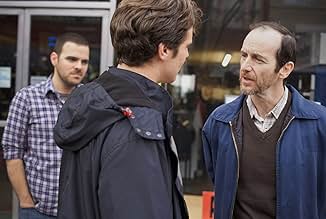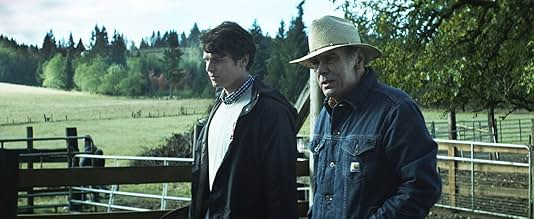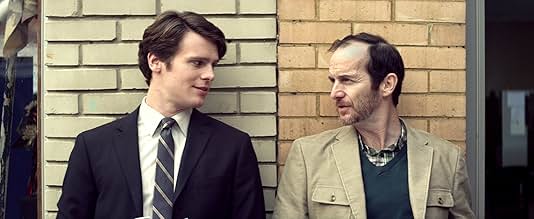Agrega una trama en tu idiomaA cocky young man travels to Oregon to work on an apple farm. Out of his element, he finds his lifestyle and notions being picked apart by everyone who crosses his path.A cocky young man travels to Oregon to work on an apple farm. Out of his element, he finds his lifestyle and notions being picked apart by everyone who crosses his path.A cocky young man travels to Oregon to work on an apple farm. Out of his element, he finds his lifestyle and notions being picked apart by everyone who crosses his path.
- Dirección
- Guionistas
- Elenco
- Premios
- 1 premio ganado y 2 nominaciones en total
Zach Sanchez-Vitale
- Military Guy
- (as Zach Sanchez)
Eloy Méndez
- Pedro
- (as Eloy Mendez)
Cami Storm
- Pretty Mexican Girl
- (as Cami Marie)
- Dirección
- Guionistas
- Todo el elenco y el equipo
- Producción, taquilla y más en IMDbPro
Opiniones destacadas
As a David Sedaris fan, I went to see this movie kinda fearful that it would not do his essay justice. This movie far surpassed my expectations and made me laugh aloud (as reading any Sedaris piece does). This adaptation of C.O.G. was faithful to the spirit of the Sedaris essay, retaining and even adding to its understated, snarky sense of humor.
Jonathan Groff stars as David, capturing a naïve and irreverent guy fresh out of college perfectly. The film opens with a montage of him rubbing shoulders with a bunch of weirdos on a greyhound until he reaches his destination: Oregon. David plans to work on an apple farm in order to experience what "real people" do. Of course, things don't go as planned and unexpected hilarity ensues.
C.O.G. is one of the best new films that I've seen this year. The style and the soundtrack evoke an eccentric yet slightly bleak mood that I really enjoyed. I find that I relate quite heavily to the post-college feelings of uncertainty and aimlessness that David has in the film as I'm sure many U.S. grads do.
Jonathan Groff stars as David, capturing a naïve and irreverent guy fresh out of college perfectly. The film opens with a montage of him rubbing shoulders with a bunch of weirdos on a greyhound until he reaches his destination: Oregon. David plans to work on an apple farm in order to experience what "real people" do. Of course, things don't go as planned and unexpected hilarity ensues.
C.O.G. is one of the best new films that I've seen this year. The style and the soundtrack evoke an eccentric yet slightly bleak mood that I really enjoyed. I find that I relate quite heavily to the post-college feelings of uncertainty and aimlessness that David has in the film as I'm sure many U.S. grads do.
C.O.G. is my favorite David Sedaris essay, even before I moved to Oregon and recognized some of its landmarks. The movie even begins with one of my favorite speeches from the essay, although the speech is much better on the page.
The story concerns a young man who fantasizes about joining the working class (as in Grapes of Wrath) and travels to Oregon to pick apples, work in an apple sorting factory, and make jade sculptures with a temperamental man who is trying to convert him to Christianity. In the essay, Sedaris, as himself, is state school educated, a stoner, accustomed to menial jobs, and from a working class family. In the movie, David – or Samuel, as he's calling himself – is a smarmy preppy educated at Yale who is first depicted reading Darwin's Origin of Species. When Sedaris makes fun of crazy people on a Greyhound, or working class people at a factory, it is clear that he is making fun of his own expectations, as well as people not far below him in social class. This is quite a contrast to an upper class character looking down on dumb poor people. This is one of the movie's first flaws. And it colors almost everything. What is his true motivation, if he is so jaded and cynical? What is the movie trying to tell us about working people and Christians when it presents us with this character as its hero?
A second flaw is one chief among Hollywood movies, even those intended for the art-house crowd. Though David Sedaris himself, as well as the lead actor, are openly gay, this movie wouldn't want to come out and just say such a thing, why people might flee into the streets. So it teases us with making us believe he might have a female love interest; it does not tell us what the source of the conflict is with his family (it would appear to be his coming out); it doesn't tell us why he is so freaked out by a co-worker's gay advances (is it because he's grossed out by the man or the concept?), or how any of this might impact his potential conversion to Christianity. I'm sure the director has a lofty, annoying explanation for this oversight, but I can count two "so, was he gay?" posts already on the list of five that show up on the main page.
The score, mainly percussion, will be off-putting to many, especially in the first scenes on the bus. And the ending will also confuse. After personal conflicts with many of the characters, how will his opinions and his Christian conversion change? We know IRL that David Sedaris went on to a happy life as a bestselling author. A less vague ending could have shown what the character learned from these experiences, especially since this movie tried so hard to be more sincere than its comedic base.
This movie has some things going for it, but it is philosophically a disappointment.
The story concerns a young man who fantasizes about joining the working class (as in Grapes of Wrath) and travels to Oregon to pick apples, work in an apple sorting factory, and make jade sculptures with a temperamental man who is trying to convert him to Christianity. In the essay, Sedaris, as himself, is state school educated, a stoner, accustomed to menial jobs, and from a working class family. In the movie, David – or Samuel, as he's calling himself – is a smarmy preppy educated at Yale who is first depicted reading Darwin's Origin of Species. When Sedaris makes fun of crazy people on a Greyhound, or working class people at a factory, it is clear that he is making fun of his own expectations, as well as people not far below him in social class. This is quite a contrast to an upper class character looking down on dumb poor people. This is one of the movie's first flaws. And it colors almost everything. What is his true motivation, if he is so jaded and cynical? What is the movie trying to tell us about working people and Christians when it presents us with this character as its hero?
A second flaw is one chief among Hollywood movies, even those intended for the art-house crowd. Though David Sedaris himself, as well as the lead actor, are openly gay, this movie wouldn't want to come out and just say such a thing, why people might flee into the streets. So it teases us with making us believe he might have a female love interest; it does not tell us what the source of the conflict is with his family (it would appear to be his coming out); it doesn't tell us why he is so freaked out by a co-worker's gay advances (is it because he's grossed out by the man or the concept?), or how any of this might impact his potential conversion to Christianity. I'm sure the director has a lofty, annoying explanation for this oversight, but I can count two "so, was he gay?" posts already on the list of five that show up on the main page.
The score, mainly percussion, will be off-putting to many, especially in the first scenes on the bus. And the ending will also confuse. After personal conflicts with many of the characters, how will his opinions and his Christian conversion change? We know IRL that David Sedaris went on to a happy life as a bestselling author. A less vague ending could have shown what the character learned from these experiences, especially since this movie tried so hard to be more sincere than its comedic base.
This movie has some things going for it, but it is philosophically a disappointment.
A rueful, seriocomic D. Sedaris memoir minus D. Sedaris—his unique authorial voice and his unmatched ability to see his goofus younger self as others must have seen him—doesn't sound like it would have much going for it, but "C.O.G." is actually a pretty good film. David, an East Coast grad student estranged from his family and otherwise at loose ends, has been persuaded by a flighty friend that this would be an excellent time for him "to get his hands dirty" picking apples in Oregon; when a tough-looking apple packer (Dale Dickey) says she'd like to "knock that f—r union rep from here to Tokyo," David asks brightly, "Have any of you actually ever been to Japan? It's a beautiful place." Clearly David's going to have some problems adjusting to life in the Hood River fruit-growing region. Writer-director Kyle Patrick Alvarez was well advised to lose the traditional coming-of-age-film voice-over; DS's unpredictable and thoroughly engaging storyline works perfectly well on its own, and the unSedarislike Jonathan Groff does just fine as David. Good work by all concerned, in fact, especially Corey Stoll and Denis O'Hare as strangers with candy. The Steve Reich percussion pieces are a little distracting at times, but mostly used to good effect.
Just saw this with a friend and ended up in the lobby of the theater discussing it with 3 other people for about 30 minutes afterward. People we'd never met.
We all agreed the film is ambiguous in every way. Uncomfortably so. The film is about a young man who is green. One is reminded of Ben from The Graduate. He appears to be a lost soul with no anchor. He reaches out to people for assistance but appears to be only mildly interested in them or what their lives are about. He tends to adopt whatever interests they have in order to remain in their employ or care. He is completely unprepared for the people he meets in his journey to find himself.
The acting is excellent by everyone. For that I give this film a high rating. I'm not sure everyone will enjoy the film but there is no denying the talent here. Just be prepared that not every character in this film is happy and full of joy. It isn't a joyful experience.
We all agreed the film is ambiguous in every way. Uncomfortably so. The film is about a young man who is green. One is reminded of Ben from The Graduate. He appears to be a lost soul with no anchor. He reaches out to people for assistance but appears to be only mildly interested in them or what their lives are about. He tends to adopt whatever interests they have in order to remain in their employ or care. He is completely unprepared for the people he meets in his journey to find himself.
The acting is excellent by everyone. For that I give this film a high rating. I'm not sure everyone will enjoy the film but there is no denying the talent here. Just be prepared that not every character in this film is happy and full of joy. It isn't a joyful experience.
I knew very little about this film when I went into it except that it was inspired in some way by a David Sedaris essay. It surpassed my expectations in a beautiful and lasting way. It's extraordinarily funny - often in surprising ways. Like Sedaris' writing, things just happen, and it's the protagonist's reactions that allow the audience to enter this world of poignant meaninglessness. The characters and situations can be so absurd at times that you wonder what kind of world this is, how realistic or how exaggerated or how cinematic - but then you realize that life can really be like that... Groff does a stellar job playing with an open-minded and humorous pretentiousness. But what I thought was most impressive was Kyle Patrick Alvarez's subtly-brilliant treatment of both sexuality and religion, both of which are such matter-of-fact gray areas in the film that they leave the viewer wondering without ever asking him to. Great film - definitely catch it when it comes out.
¿Sabías que…?
- TriviaJonathan Groff - who is gay in real life - was attracted to the film because of its portrayal of a homosexual lead where his sexuality is not the key focus.
- Bandas sonorasEl Gusto
Written by Edward M. Smith
Performed by Eduardo Padilla
Courtesy of Black Toast Music
Selecciones populares
Inicia sesión para calificar y agrega a la lista de videos para obtener recomendaciones personalizadas
- How long is C.O.G.?Con tecnología de Alexa
Detalles
- Fecha de lanzamiento
- País de origen
- Sitios oficiales
- Idiomas
- También se conoce como
- Welcome to Oregon
- Locaciones de filmación
- Productoras
- Ver más créditos de la compañía en IMDbPro
Taquilla
- Total en EE. UU. y Canadá
- USD 55,301
- Fin de semana de estreno en EE. UU. y Canadá
- USD 32,677
- 22 sep 2013
- Total a nivel mundial
- USD 55,301
- Tiempo de ejecución
- 1h 28min(88 min)
- Color
- Relación de aspecto
- 2.35 : 1
Contribuir a esta página
Sugiere una edición o agrega el contenido que falta






























